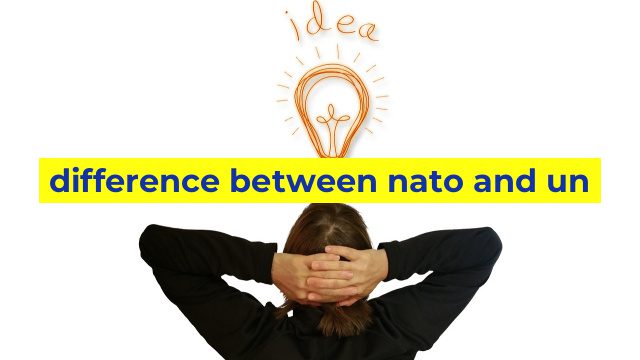The Difference Between NATO and UN: Understanding Their Roles in International Relations
When it comes to ensuring global peace and security, two organizations immediately come to mind: NATO and UN. While both NATO and UN work towards maintaining peace, each has a distinct role in international relations. Understanding the difference between NATO and UN is crucial in understanding their policies, objectives, and the way they operate.
NATO: North Atlantic Treaty Organization
NATO was established in 1949 with the primary objective of providing mutual defense among its members. Its member states consist of 30 North American and European countries, all committed to the NATO treaty’s principles and objectives. Its purpose is to protect the territorial integrity and political independence of its members against potential security threats.
NATO’s role is to maintain a robust, collective defense capability using diplomatic, military, and economic means. The defense alliance aims to deter any potential attack, and if required, take rapid and decisive defensive action against any threat to the territorial integrity of its members. NATO also plays a crucial role in promoting global stability by engaging in dialogue with other nations and fostering cooperation in areas such as counter-terrorism and cyber defense.
UN: United Nations
The United Nations, established in 1945, aims at promoting cooperation among nations and maintaining international peace and security. The UN comprises 193 member states and operates on the principles of collective responsibility, respect for human rights, and the rule of law. It has six main organs: the General Assembly, the Security Council, the International Court of Justice, the Economic and Social Council, the Trusteeship Council, and the Secretariat.
Unlike NATO, the UN is not a military alliance. Instead, its primary role is to mediate and resolve conflicts using peaceful means such as diplomacy, sanctions, and peacekeeping missions. The organization also plays a crucial role in addressing issues such as climate change, global health, and poverty.
The Key Differences Between NATO and UN
While both NATO and UN work for global peace and security, they are fundamentally different. NATO is a military alliance that focuses on providing collective defense for its members, while the UN is a political organization that aims at resolving conflicts through peaceful means.
Another significant difference between the two organizations is that NATO acts based on collective defense, meaning the members of NATO pledge to defend each other against an attack. In contrast, UN peacekeeping missions require the consent of all parties involved.
Furthermore, NATO is primarily concerned with threats to its member countries, while the UN takes a broader approach to global issues. The UN is involved in various programs, including humanitarian aid, development, and the protection of human rights.
In conclusion, NATO and UN may have similar goals, but their approaches to achieving these goals are different. NATO’s primary focus is to provide military protection to its member states, while the UN aims to resolve conflicts through diplomatic means. Understanding how these organizations differ from each other is crucial in determining how best to approach global issues and maintain international peace and security.
Table difference between nato and un
| Aspect | NATO | UN |
|---|---|---|
| Purpose | Military alliance for collective defense | Intergovernmental organization to promote peace, security and cooperation |
| Members | 30 member countries | 193 member countries |
| Headquarters | Brussels, Belgium | New York City, USA |
| Security Council | Does not have a security council | Has a Security Council responsible for maintaining international peace and security |
| Decision-making | Based on consensus among member countries | Based on vote counting among member countries |
| Focus | Primarily on military matters, including defense spending and military conflicts | Focus on wider issues of international cooperation such as humanitarian aid, social and economic development, and human rights |


